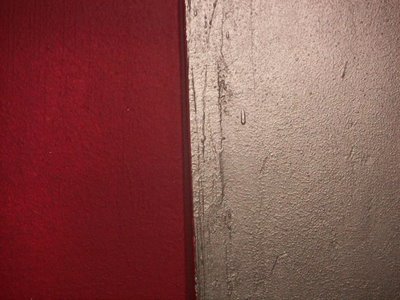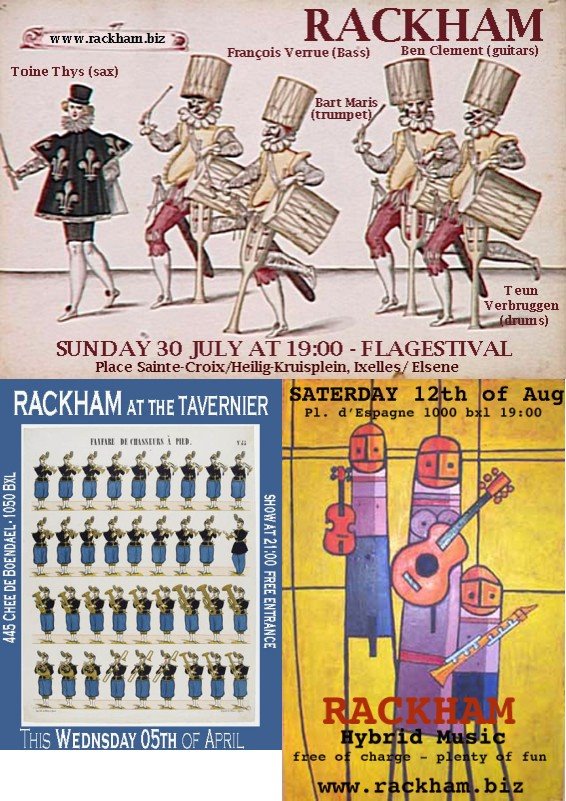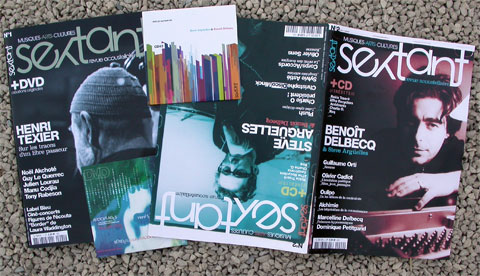the sound of grammar

If you've never been to Ornette Coleman's house (I'd never even heard him speak), now you can at least see a bit of it, thanks to this interview video by the French magazine L'Express. The first part is a solo improvisation.
freeform jazz will destroy the world

If you've never been to Ornette Coleman's house (I'd never even heard him speak), now you can at least see a bit of it, thanks to this interview video by the French magazine L'Express. The first part is a solo improvisation.
Posted by
Moandji Ezana
|
permalink
|
|
![]()
Frequent and long-time be.jazz commenter Godoggo has lately been very active on his own blog. I like his style.
I saw a second-hand copy of John Carter's Dauwhe a few weeks ago and rushed to pick it up, even though I wasn't sure if it was part of his famed Roots And Folklore series. I've heard a lot about the series and Castles of Ghana in particular, but Dauwhe is the first one I've come across. It's still unlistened-to, as the first time I put it on was while laying down the new floors and the music quickly proved unsuitable to such a task. It was replaced with either 3121, T.I. or Arcade Fire, so my discovery of that appetising "seamless melding of composition and free improvisation... rooted so deeply in the blues and swing" will have to wait a little while longer.
Speaking of the composition-free improvisation continuum, G. links to Steuart Liebig's "Goals in Composition/A Riposte to Critics," which is a worthy addition to the "Artists Should Be Writing" file.
[Some people] have been disappointed that the improvised material did not have the same intent and fervor that they are used to hearing from other people who work in a similar vein. To them I would say that they are used to people improvising with disregard for the written material, which is an anathema to me.
Too often I have heard concerts or recordings where written material is played and then the improvised material starts . . . and there is little or no connection between them. I find this lack of connection tiresome - - I often question the need for the written material if the players do not tie their improvisation into the piece at hand.
Posted by
Moandji Ezana
|
permalink
|
|
![]()

"La troisième bataille du jazz" (Jazz's Third Battle) by Francis Marmande, about Albert Ayler, and more specifically about his late-50s army stint in France and a near-riot-inducing 1966 concert. Marmande is such a great writer. Some find his style over-wrought, but it's not: he's in control the whole time. You couldn't write an article like this in english (sorry, english-only readers).
Posted by
Moandji Ezana
|
permalink
|
|
![]()

Keith Jarrett Solo Concerts: Bremen and Lausanne -> Brad Mehldau Live In Tokyo
A few years ago, it was cliché to affiliate Mehldau with Evans and now it's cliché to do the same with Jarrett. I don't know if Jarrett invented the mix of jazz, folk, pop, concert hall-ready barrelhouse, super consonance and minimalism of his 70s solos concerts, but I think it made Mehldau's LIT possible. "Things Behind The Sun," "River Man" and "Paranoid Android" sound like Jarrett stuffed back into a song structure. By the way, Solo Concerts: Bremen and Lausanne is one to get for those who like Jarrett's playing but can't stand his voice.
Unrelated to Jarrett: I'm not particularly taken with the "Monk's Dream" on LIT: I think I prefer my Monk more hard-bitten, which would explain why the most pleasing part of this version is the straight-forward theme recap at the end. All the other tracks are real songs, and Mehldau tackles them expertly.
Several years ago, I read an interview of his in which he said that the main challenge in playing post-GAS songs was finding a way to arrange them. On LIT, Mehldau applies a similar arrangement sensibility to Gershwin, Drake and Radiohead. It's a powerful one, as he never simply blows over the changes, but is constantly manipulating the song's mood and material: he's reshuffling and repainting the furniture, rather than stripping the house down to its foundations and building it back up again. It's almost like he's creating a reduction of, say, Nat King Cole singing a heavily orchestrated "Nature Boy," in real time. Actually, the Jarrettisms evoked above creep into his Gershwin, too. For example, in the percussive chords that extend the end of "Someone To Watch Over Me." It's largely gratuitous, but not entirely so, as it emphasises a note that served as a pedal*, an octave or two lower, at the beginning of the tune.
Joe Henderson The State of the Tenor -> Chris Lightcap Big Mouth
More specifically, Ron Carter's "Loose Change," with its double stops and customised straight-eights beat, sounds very much like a precursor to the kind of compositions Lightcap writes for Tony Malaby and Bill McHenry.
It's weird to think that Henderson was only 48 at the time. Even in the 60s, he looked a lot older than he was. Are enough 26 year old instrumentalists being given the opportunity to make the kind of splash the Shorters, Hendersons, Hancocks, Hills et al. could? Is it still even possible? I'd like to think so.
* It might not be a pedal, but in any case there's a note that's emphasised across a number of chords and strongly influences the character of the interpretation.
Posted by
Moandji Ezana
|
permalink
|
|
![]()

Mobjazz (a jazz blog in french I only recently found out about) follows Piano Bleu in suggesting that House On Hill (cf. moving in with brad parts 1 and 2) is actually a series of variations on "August Ending." Don't know if it's true, but that could account for the similarities between tracks and the even progression that's maintained from beginning to end.
Looking at his Nonesuch discography, it's striking that in 2 years, he's released 5 albums (counting the upcoming duo with Pat Metheny), but each one in a different context (if you count the trios with Rossy and Ballard as different contexts). Is this overproduction or simply a schedule appropriate to jazz musicians and their two-days-in-the-studio albums?
Posted by
Moandji Ezana
|
permalink
|
|
![]()
Ethan's 1973-1990 survey is insane. The record descriptions are generally short, but any blogger will appreciate how much work it takes to draw up a list like that one. Ostensibly, he's patching together a history long past, but my favourite aspect of it is that in the cracks there emerges an idealised community of present-day jazz musicians listening to bootlegs, copying the masters' solos or playing on their recording sessions, then having lunch. I am mildly worried by how few of these records (nine) I have.
Posted by
Moandji Ezana
|
permalink
|
|
![]()
The duet between a bass and a non-harmonic instrument: if it's not already a cottage industry, it should be. To me, an album of clarinet and bass duets is quite appealing.
WaR, an EP-length album by Rawfishboys (MySpace) a.k.a Joachim Badenhorst (clarinet) and Brice Soniano (bass). They mix delicate and touching songs with some slightly harsher improvised pieces. Sometimes they do both on the same track: "no Fridge For clusters" goes from improv to song and back, turning the old head-solo-head form inside out. Think Giuffre/Bley/Swallow meets, well, Giuffre/Hall/Brookmeyer, but without the middle men. Album-closer "maya" has much of "The Western Suite"'s rustic charm.
Rawfishboys - "boetie"
"boetie," WaR's first track, falls in the delicate and touching camp. There's a second version later in the album, in which the roles are reversed: the clarinet sighs the descending lament, while the bass provides the surrounding flutters.
Posted by
Moandji Ezana
|
permalink
|
|
![]()
labels: CDs, joachim badenhorst, MP3s

I don't have too much to add beyond what has already been said by Ben Ratliff and Status Ain't Hood. I lean more towards Ratliff's appreciation ("it had a stop-and-start, by-the-numbers feeling") than Breihan's enthusiasm ("I walked in blind and walked out converted, and it's pretty great when that happens"). The set wss almost exactly the same, and I agree with both of them that "His Hands" was pretty much the only really haunting moment. The band was slightly different: no horns and it's highly unlikely the drummer was Staton's son. Overall, I vastly preferred Bettye Lavette's flayed voice and mix of earnest intensity with old-school showwomanship. In comparaison, Staton was rather superficial.
The show started with "Suspicious Minds," "I'm Just A Prisoner (Of Your Good Lovin')" and Merle Haggard's "You Don't Have Far to Go" and ended with the great "You've Got The Love" and "Young Hearts Run Free." The disco grooves ran deeper than the straight soul; the guitarist added some particularly good solos to the country songs. In between, she stated a preference for mature men who know what you need and when you need it over young fools (who, presumably, don't know either), declarared a generalised love for the audience, told a sad tale about the cycle of poverty and violence in the ghetto and recommended that we stand by our men, but also inquired as to who she was and what she was to us. It was the first encore I've seen taken so literally: they came back on and simply extended "Young Hearts Run Free."
I don't know if musicians really like the obligatory solo section. The drummer went all stony-faced during his solo, but his smile came back as soon as he returned to the groove. The Petrol crowd was appreciative, though. If you ever go to that cavernous docklands club, make sure to visit the chandelier in the back room: it's made entirely out of plastic glasses.
Will Layman's article on fusion is another good installment in his column. It focuses on Wayne Horvitz, Bobby Previte, Ben Goldberg, Don Byron and John Zorn.
today the act of fusing jazz with other forms of music is so essential — and so natural — to what jazz musicians do that it typically involves more than one fusing at the same time.
(...)
Naked City played super-tight sets that sounded like they were controlled by a very hip two year-old with a remote control in hand: reggae crosscut to Bugs Bunny music crosscut to death metal crosscut to film noir soundtrack. In that group's first disc from 1989, the gauntlet of the new fusion had been thrown: jazz musicians could now play absolutely anything in their way, but only best would be able to make the great crush of American variety truly their own.
(...)
[Horvitz and Previte's] relatively early work had a characteristic "fusion" sound, but it was hardly the sound of squealingly precise guitars or funked-out jams. Taking their cue from soundtrack music, Camera and Claude's were works of melody, atmosphere, and arrangement, with rock and pop rhythms taking their rightful place beside swing as valid ingredients in a "fused" American music. That these musicians improvised with authority and within a certain musical vocabulary meant that it was still "jazz", but the word was clearly being bent in new ways.
Their invention is characterised by (a) the hybridisation of disparate genres (free jazz inherited from the Ornette Coleman generation, punk's abrasiveness, Balkan folklore, the klezmer tradition), (b) the integration of instruments and phrasing borrowed from noise-rock (echoing and distorted guitar) or chamber music (cello), (c) situating improvisatory spaces within ambitious thematic structures (generally refusing the classic theme-solos-theme form), and (d) iconoclastic attitudes (from excessive volume to shocking album covers). This New York scene thus established an expressive space that linked the jazz explosion of the 1960s (Coleman, Dolphy, Mingus, Coltrane, Ayler), contemporary chamber music (Boulez, Ligeti, etc.), aleatory explorations (Cage), the noise subculture (Japanese hardcore, Sonic Youth), funk (Prince), jazz-rock (Mahavishnu Orchestra) and 1970s European Free Music (Brötzmann, ICP) and even prog-rock (Robert Wyatt).
The scene is characterised by its very fragmentation: there is no dominant voice, no clearly imposed creative method - which seems to me an excellent environment to create music. Now that the more or less major upheavals of the modernist movement have taken place, we can get to making music with everything at our disposal, instead of being limited by one or the other philosophy that imposes a narrow conception of art or music... This conception of "freedom" is complex, however... For me, to be postmodern means to be "free" to draw on any idea and any influence, while being "free" to displace them into a different context, to mix them in a unique way and to recombine them with different ideas.Tim Berne brings some grist to the current "who needs a label" discussion (cf. visionsong's interesting, personal and pragmatic take), even though his interview dates back to 1997, the CD-selling heyday:
I've had a lot of disappointments with labels. Most of the time, even if you sign with a major, the discs end up wasted, the company goes bankrupt or is sold. Musicians are used to being insistent and resilient, they hang on even when the financial conditions are bad. But the major label employees only know one way of selling CDs, which is to place them in stores and wait. They do that for a month or two, then they get bored. They can't think on a smaller scale, adopt a more grassroots approach. They're hooked on the system and can't see beyond it. To promote a CD, they just sign a check for $50,000 and put an ad in Down Beat or Musician.
By starting my Screwgun label in 1997, I sought to reach people more directly, because we play all over the world and people always want to know where they can get our CD. That tells me that distributors aren't doing their job. I didn't want to go on like that, so I take my albums with me to sell after concerts. You can also get them by mail or order them from the web site, alongside the distribution networks in the stores. Also, I didn't want to be subjected to other people's calendar and whims: this way, we make a record, we put it out and we move on to the next one. It's worked very well, it's totally viable. It was easy enough, except that it's a huge investment of time and energy.
Posted by
Moandji Ezana
|
permalink
|
|
![]()
Mwanji Ezana of be.jazz renown has posted a spectacular review of artsongwriter Corey Dargel's debut CD, Less Famous than You -- a thoughtful, colorful and detailed analysis I'd be giddy to have written. Do not miss it. - Steve SmithI'm blushing (and believe me, that takes some doing). The review in question is just below.
Posted by
Moandji Ezana
|
permalink
|
|
![]()

Corey Dargel (website | MySpace | blog) has a nice backstory: classical training (as the saying goes) allows him to be reviewed by Anthony Tommasini and write serious manifestos for NewMusicBox (the big one, the more modest early one), but he also lets his pop instincts lead him to a twisted confluence of art song and electronic pop and offbeat publicity photos. Less Famous Than You embodies Dargel's artsongwriter concept: he writes music, then sets his own words to them. Thus, lyricist, singer/songwriter and composer cohabit without fusing.
Corey's singing is affecting without much emoting. The distance thus created indicates that these are portraits rather than confessions. The cover art shows us his viewpoint: observing those who are looking at others more worthy of recognition. For example, the joy of "Glasses" is sung in much the same way as the loss and loneliness of "I Don't Remember." "Change The World" is the exception to the rule: his voice turns listless and drags sadly when evoking a situation closer to his own life.
Most songs are about mental disorders, obsessions or psychological violence of some sort (kind of like Gnarls Barkley, actually). This is unsurprising, given that Dargel has also written a series of songs based on the effects of prescription drugs. Stalkers, fan(atic)s, exploited child stars, jilted lovers and others illustrate a media and pharmaceutical system that generates or exacerbates individuals' weaknesses.
The music is often an intricate weaving of superposed keyboard parts and beats that range from staticky to euro-house. It has a certain brand of well-crafted sloppiness: elements are positioned so as to create the illusion of being a little out-of-sync and disturbances bubble just under the surface. The densely-layered melodies are quietly exuberant in their orchestration and profusion, betraying a warm, beating heart underneath a cool exterior. Dargel's deadpan is thus emphasised but also lent crucial shading.
Logically, Corey manipulates the conventions of pop like a native but also subverts them like an outsider. "Glasses" combines bright - almost naïve - 80s synths with slippery beats in 9. All songs are of pop-ideal length, hovering around the 3 minute mark, but the slowly unfurling narratives and frequent lack of oft-repeated choruses go counter to the time constraint and create a kind of laid-back tension. The distinction between the metaphorical and the concrete is often blurred, which allows Corey to be neither obvious nor cryptic while creating complex stories. Still, even the most elusive song can suddenly drop a hard-hitting line like "Since when does disability equal a lack of devotion?"
It's not all about subversion, though. "Boy Detective" is a perfect demonstration of Dargel's intimate acquaintance with the myriad minute details that make pop music work: here, that means a hollowed-out effect on his voice and neat, touching, synth-driven hooks.
Despite music and lyrics being conceived independently, some tracks sound quasi-programmatic. In "Like A Ghost," the narrator's complaint that his lover is concealing his/her true nature and constant celebration of his partner's weaknesses goes from righteous to oppressive, a way to control rather than support. This is echoed by the way Corey seems to deliberately warp and distort his usually gorgeous keyboards into grotesque shapes. On the wistful "Change The World," as Dargel sings about reuniting a former band, the track's instrumentation grows from a solo act to a full band.
There's room for humour too. It comes in pinches, such as the Madonna-ish oops-I-didn't-know-we-couldn't-talk-about-that way he says "sex" on "Global World View" or the computer-enhanced high-note on the chorus of "The News" (an ascending line that peaks on "untrue"), or in dollops: pretty much the whole of "Gay Cowboys"' epic road trip and "Every Word..."'s triumphant finale that mockingly underlines the main character's spiralling delusions.
Finally, I don't really recognise any of the famous or semi-famous who are described or obsessed over, but I have a probably totally wrong theory that "Global World View" is about a repressed love affair with Osama Bin Laden: "Now you're playing it safe/Staying in your cave," "They said you're a threat to my freedom," "I have to stop making out checks to your organisation."
For more, see Darcy and The Rambler's reviews.
Punk rock may now be by the babies, for the parents, but I don't really care about punk rock. I do care about this:
The Care Bears [on Fire] —singer-guitarist Sophie Kasakove, 11, bassist-singer Lucio Westmoreland, 11, and drummer-singer Isadora “Izzy” Schappell-Spillman, 10, all classmates at Park Slope’s Berkeley Carroll SchoolThat's where I went to first and second grades. Despite piano lessons and a futile attempt to count my father's LPs (I stopped after a few hundred) that was probably the seed of my collector-ism, I was never featured in a magazine of any description. By the time I was the CBoF's age, I was going to Masaï Mara rather than Fairway (whatever that is), so I don't feel too underpriveleged.
Posted by
Moandji Ezana
|
permalink
|
|
![]()
Graphic design is obviously not my strong point, but I've attempted to get a sleeker, lighter look. Let me know what you think: easier or harder to read? More or less eye fatigue? Etc.
Posted by
Moandji Ezana
|
permalink
|
|
![]()
VVG Trio - In Orbit
Re-reading the review, I find it rather stiff. Oh well. Hopefully the post and MP3 dedicated to the VVG are a little more relaxed.
Posted by
Moandji Ezana
|
permalink
|
|
![]()

Bojan Z's Xenophonia is easily among the best and, especially, most pleasurable recent albums (jazz or otherwise) I've heard in a good long while. It's bursting with imagination and sure to be on a number of 2006 lists. I don't have his previous album, Transpacifik, but I've heard it a few times and it's another lovely record, more of an acoustic trio, despite the presence of a Fender Rhodes. Here's an interview in English I'm happy to see:
In general that's where I find my inspiration, in life. One thing I know for sure my inspiration is life and not death. It's interesting, that I know for sure from those few years of war [in Yugoslavia], you know, there was death all over the place—nothing artistic was coming out of this. But life! Ahhh! You know, colors, people, food and nature, smells, the sounds of course. I'm very, how do you say, sensitive to it?
(...)
[For Xenophonia] I just took more time to work on the sound—the vertical dimension—the colors, the profundity, which sound goes where. For example, on some of the instruments I play, I had this set-up which was acoustic piano, Fender Rhodes and customized Fender Rhodes which gives me quite a lot of possibilities sound-wise— mixing the piano with Fender Rhodes... In general, about the performance, we were all working on textures and sounds more than who's going to be the fastest, that's where the difference for me is.
(...)
I bought my first Fender Rhodes in ' 81 in a bar in a village next to Belgrade and the funny thing is that a few years ago, knowing that in Belgrade I can eventually find a Fender Rhodes cheap I called my brother to try to find something there and he found actually the same village. But he found just the shell of a Fender Rhodes and just a few keys.
(...)
[W]hat I did was I started buying all the parts on e-bay and basically I had different vintages and different years and while I was putting this thing together I kept all the imperfections. I actually wanted every note to sound different because it was not the point to have to have just another Fender Rhodes—I was dreaming about having an instrument that I could tamper with for Arabic scales or scales coming from cultures other than European for quite some time.
With a piano you cannot do it because you have to have your own tuner. It's impossible. But I thought finally, that's what I'm going to do with this guy; it's easier to learn how to tune it, instead of having to find some effects, distortion, treating it like a guitar and thing like this you know. That's why I call it “xenophone.” Why? Besides the connection to the name of the record—it's the reaction I get every time I plug it in and play something on it and I observe the reaction from most of the people—it’s like some stranger, some naked stranger has walked in. Ahh!! What is this?!
Scott Colley told me a few years ago that before each set in the Village Vanguard Jim Hall would take a mike and say something, you know, good old man, decent, jazz guitar legend and saying things like: “I’m listening to so many different styles of music and find myself still discovering things. Recently I bought a record of the Dixie Chicks. It’s amazing what they do.” And the people die laughing. And then: “Seriously, I am not used to living in a fascist regime.” This at the Village Vanguard. But you’ll never hear a word about it in any of those “jazz” newspapers, but what you will see is “My Favourite Things’ questionnaires to Kenny Barron. It’s like an interview:
Q: Which is your favourite watch?
Kenny Barron: Well, I have a Rolex…
Q: “What’s your favourite color?”
Can you imagine this? Toshiko Akiyoshi and Lew Tabackin!
Q: What is your favourite wine?”
A: Oh, Chateau Ikan, 1929—they never let you down.
They are serious! You guys are serious, one bottle is $6,000!...
Besides that then you have the thing that middle class gigs are non-existent. You know most of us, we live from the gigs which are financially speaking from $1,000 to $10,000 range, you know it depends where you are, smaller or bigger hall, bigger venue. You know I’m speaking about bands, band price. And this doesn’t exist; they have from zero to $1,000, which is….pay a band with this! And then you have these tremendous numbers of thousands of dollars from $10,000 on for Sonny Rollins and Keith Jarrett and people like this.
So this has completely killed the economy that the music can generate... The reverse side of the coin is if you find yourself in front of saxophonist Joe Lovano, he is going to blow your mind! You’re going to get scared. So that’s the other side of the coin, music artistry, the giants that are still alive and kicking. That’s not just a legend, it is true. It’s happening.
(...)
I just love hearing all these different things piano-wise, just on the one hand to remember the lost colors of this instrument because there is a tendency nowadays growing into a certain pattern of piano playing that most of the pianist are using and they just forget about these things for example, Errol Garner or Earl Hines and guys like this, the way they were using this instrument—so all these colors are a bit left aside. So, Duke Ellington is one of my favorite piano players because he's the one I like listening to at almost any moment of the day, so fresh and so mysterious and his attitude so...hip!
Now that Switzerland's favourite son has his own church, he's surely doomed to never win another Grand Slam again...
+
Divergent duos are great fodder for extra-long articles (I consider the above a Wallace-Federer duet). After Burton (and a bit of Green), come Patton and Benjamin, inevitably. One thing I don't understand, is why, right at the end Dee asks
You wonder, too, about the degree to which Big Boi knows all this about his old friend, and knows that the key to staying together is to let André talk about leaving all he wantsIt'd be bad enough on its own (the old "musicians aren't self-reflexive and therefore can't possibly be as insightful as I am" move), but is extremely puzzling after multiple assertions by the author himself that Big Boi is fully cognizant of the situation.
Part of the psychology of collecting jazz is that we fans covet not only the music but also the record labels.I semi-agree with this, contra Darcy's disdain for a world "where listeners (not just promoters) actually care about what label you're on." I still think that a label's role as gatekeeper/beacon/handy collection organiser is helpful. Come to think of it, a label is a little (and, today, increasingly) like a dematerialised record store.
Posted by
Moandji Ezana
|
permalink
|
|
![]()

ODD: DJ Martian links to another list, but with different entries. I don't know where the truth lies.
ADDED: list complete
UK mag Jazzwise has a "The 100 Albums That Shook The World" feature this month. The full list isn't available on the website, but the last three are, two of which are be.jazz favourites:
100 Polar Bear Held On The Tips of Fingers
...Groundbreaking, it gave young British jazz bands the guts to label themselves like rock bands and to stretch beyond their comfort zones.Actually, I'm listening to Joey Baron's Tongue In Groove for the first time as I type this, and it sounds in spots like a precursor to Polar Bear.
Very few jazz groups today set out to mess with your head. You know, get inside there, push the furniture over, chuck things out of the window and generally make a nuisance of themselves...
1 Miles Davis Kind Of Blue
2 John Coltrane Love Supreme
3 Ornette Coleman Shape of Jazz to come
4 Bill Evans Trio Sunday at the Village Vangaurd
5 Sonny Rollins Saxophone Colossus
6 Thelonious Monk Brillant Corners
7 Charles Mingus Ah Um
8 Charlie Parker Savoy Recordings
9 Miles Davis Bitches Brew
10 Keith Jarrett Köln Concert
11 Coltrane Giants Steps
12 Eric Dolphy Out To Lunch
13 Louis Armstrong Complete Hot 5 and 7
14 Duke Ellington Blanton-Webster Band
15 Mahavishnu Orchestra Inner Mounting Flame
16 Albert Ayler Spiritual Unity
17 Herbie Hancock Head Hunters
18 Dave Brubeck Time Out
19 Ornette Coleman Free Jazz
20 Weather Report Heavy Weather
21 Ahmad Jamal But Not For Me
22 Jerry Roll Morton Volume 1
23 Frank Sinatra Songs For Swingin' Lovers
24 Wes Montgomery The Incredible Jazz Guitar
25 Modern Jazz Quartet Fontessa
26 Bud Powell The Genius of Bud Powell
27 Cecil Taylor At The Café Montmartre
28 Art Blakey Moanin'
29 Herbie Hancock Maiden Voyage
30 Getz/Gilberto Getz/Gilberto
31 Pat Metheny Bright Size Life
32 Jimmy Smith A New Sound
33 Jan Garbarek Afric Pepperbird
34 Woody Herman Thundering herds
35 Duke Ellington At Newport
36 Ella Fitzgerald Sings The cole Porter Songbook
37 Charles Mingus The Black Saint and the Sinner Lady
38 Cannonball Adderley Somethin' Else
39 Lifetime Emergency
40 Billie Holiday At JATP
41 Chick Corea Return To Forever
42 Stan Getz Focus
43 Miles Davis Sketches of Spain
44 George Russell Jazz Workshop
45 John Coltrane Impressions
46 Andrew Hill Point Of Departure
47 Sonny Rollins The Bridge
48 Sun Ra Heliocentric Worlds
49 Dizzy Gillepsie Shaw Nuff'
50 Lennie Tristano Tristano
51 John Zorn Naked City
52 John McLaughlin Extrapolation
53 Pharoah Sanders Karma
54 Lester young Lester Young/Buddy Rich Trio
55 John Coltrane Ascension
56 Art Ensemble 0f Chicago A Jackson In Your House
57 Horace silver Song For My Father
58 Clifford Brown/Max Roach Quintet
59 Coleman Hawkins Body And Soul
60 Peter Brötzmann octet Machine Gun
61 Miles Davis Birth Of The Cool
62 Count Basie The Atomic Mr. Basie
63 Archie Shepp Four For Trane
64 Brad Meldhau Art Of The Trio vol.3
65 Gerry Mulligan Gerry Mulligan Quartet
66 Gil Evans The Individualism Of Gil Evans
67 John Handy Live At Monterrey
68 EST From Gargarin's Point Of View
69 Stan Tracey Jazz Suite Inspired By Dylan Thomas
70 Dollar Brand African Marketplace
71 Wayne Shorter Speak No Evil
72 Thelonious Monk Genius Of Modern Music vol.1
73 Roland Kirk Rip, Rig And Panic
74 Herbie Hancock New Standard
75 Oscar Peterson Night Train
76 Charles Lloyd Dream Weaver
77 Art Tatum The Genius Of Art Tatum No. 1
78 Betty carter An Audience With Betty Carter
79 Oliver Nelson Blues And The Abstract Truth
80 John Surnam Tales of Algonquin
81 Eberhard Weber Colours of Chloe
82 Steve Coleman and 5 elements Tao of Mad Phat
83 Diana Krall Love Scenes
84 Anthony Braxton For Alto
85 Kryztof Komeda Astigmatic
86 Steps Ahead Steps Ahead
87 Django Reinhardt Retrospective 34-53
88 Joe Harriot-John Mayer double Quintet Indo-Jazz Suite
89 Jackie McLean Let Freedom Ring
90 Charlie Haden Liberation Music Orchestra
91 MIC MIC
92 Sarah Vaughan Sarah Vaughan
93 Jan Johanssen Jazz Pa Svenska
94 Cassandra Wilson Blue Light Til Dawn
95 Wynton Marsalis Black Codes
96 Medeski,Martin and Wood Combustication
97 Tomasz Stanko Soul of Things
98 Courtney Pine Journey to the Urge Within
"...A pied piper who led British jazz out of the trough of despond after its brilliant flowering in the 1960s..."
99 The Bad Plus These Are The Vistas
100 Polar Bear Held On The Tips Of Fingers

Listening to Clipse for the first time. "Mr. Me Too," their current Pharell-enhanced single, is alright, but make sure to check out "WAMP WAMP," which is awesome: the beat is an echo-y one-bar timbales sample and a two-note steel drum riff that spirals out into a little melody at every eight bars. Add a kick booming in the distance, some synths on the chorus and a shaker that resonates particularly well with the s-rhyming third verse. That's about it (no snare, no hi-hat). "Ain't Cha" is more conventional, but the posh accent on the second verse is hilarious.
"Déjà Vu" was a pretty weak single (the highlight is when she says "Jay" in the same way she said "hi-hat"), but Beyoncé's new one, "Ring The Alarm," is great and has the energy of her 2006 BET Awards performance. Can she get any closer to rapping without actually rapping? Is "Ring The Alarm" actually a duet with a siren? Is the lo-fi mic sound the r'n'b thing of the moment (cf. "SexyBack")?
ADDENDUM:
I'm not sure where this anti-Gnarls Barkley article (via Status Ain't Hood) leaves me: I like GB and Goodie Mob, T.I. and The Roots and it was pretty clear right away to me what The New Danger was drawing upon. Just like it's obvious what D'Angelo's Voodoo drew upon. That didn't stop either from being good and great records, respectively. There are a number of points I agree with, but I really dislike the "rap has enough room for experimentation, so do not leave that room, please" viewpoint. Actually, rappers who stop rapping (or hip hop producers who do other genres) are probably more likely to produce something good than, say, a rocker who starts rapping.
Finally, the reason I highlighted Clipse's "WAMP WAMP" is because it seemed refreshingly experimental or progressive, but so is St. Elsewhere. The criticism I don't get is "it's underdeveloped/half-assed." Not that every track is pure brilliance, mind you. Maybe a steady diet of improvised music warps your sense of the fully-assed.
Posted by
Moandji Ezana
|
permalink
|
|
![]()

Prof. Heebie McJeebie interviews Darc. James Argue.
+
John Zorn's recent appearance at the 2006 Marciac festival (the rural corner of France annexed by Wynton Marsalis) has generated some controversy. In brief, a local reporter took offence to the star of David on Zorn's hoodie, his combat pants and the "assault tank-like" music, in the context of the Lebanon war. Later, a host on France Inter radio raised the issue not once but three times in the space of 20 minutes, during the broadcast of an excerpt of the Electric Masada concert. Libération's Serge Loupien refuted the claims in print.
On his political blog, Samizdjazz explores the issue in some depth. He locates the beginning of Zorn's extensive exploration of his Jewish roots at the death of his father in 1992, notes the near-totla absence of on-record political pronouncements by Zorn and then evokes two varieties of zionism, national and cultural, among many other flavours.
Posted by
Moandji Ezana
|
permalink
|
|
![]()
Enough with the rock saxophone solos (although I'll allow that Darcy's #1 rock sax solo comes from a very good song), let's move on to saxophone-led rocking jazz.
"Thing" is one of my favourite Acoustic Ladyland songs from Last Chance Disco. It's unfortunate that the sound here doesn't do justice to the sheer gorgeousness of its slow bridge. "Iggy" is another cool one. Both featured on their Later! With Jools Holland appearance:
Posted by
Moandji Ezana
|
permalink
|
|
![]()
A home improvement diary (12-16/08/2006).
Days 1 & 2
I feel so hip and trendy: bamboo, baby! Of course, I didn't feel either when rushing to the hardware store to make some last-minute purchases, sweaty and hair caked with saw dust. Seeing the pretty and well-dressed (or, at least, clean) young couples who had the foresight to buy everything they needed before DIY-ing (or had not yet had the chance to have their lack of foresight exposed), I found consolation by reassuring myself that they weren't cool enough to have bamboo floors. 
Trendiness aside, there's the sheer relief of finally getting rid of the horrible tiles and old, sunken wooden floor we inherited from the previous owners.
We're lucky to stumble upon the excellent idea of starting with the kitchen and dining-room, which are tiled (see below). Work continues monday and tuesday, which I have off work. So much for the four-day week-end, this is more tiring (and less blog-friendly) than a day at the office.
Day 3
Disaster strikes. The DIY gods had smiled upon us for two days, but now an ill-intentioned one has taken over (translate the Zeus-Hera relationship to the DIY pantheon). The little that had been done in the living room is torn out when we realise it isn't straight.
Very few of the walls in this house are straight, so a little creativity and grade-school geometry has to be used. Lesson learnt: it's much easier to lay flooring over tiles than old, irregular wood. A long, exhausting and frustratingly unproductive day.
Day 4
Some progress made in the living room, but even more in the bathroom, done in an evening. All that remains is the bath tub's casing, which IVN has elaborate plans for.
Day 5
It's Wednesday and I'm back at work. Work mornings are particularly painful now, as we've removed two radiators and therefore have no hot water. Spraying bone-chilling water on yourself at 6:45 AM is, shall we say, character-building. It reminds me of when we first moved in and there was no running hot water: we'd boil some water in the electric heater in the kitchen and wash in the basement with a bowl and a bucket, next to a hole in the ground (that, fortunately, can be covered) that accesses the sewer.
Actually, that just-moved-in feel is everywhere, from the empty rooms to the late-night huddling in the upstairs guest-room (if you're in Belgium and need accomodation...) to eat Vietnamese take-away or bizarre, bottom-of-the-fridge meals (e.g. half a cucumber, a carrott, half a ciabatta and two yoghurts).
When I get home I help IVN finish the living room (we finally got the hang of the nail gun and irregular floor. The nail gun is hardly the effective monster-killer Doom would have you believe). The kitchen and dining room have been sanded and given their first layer of oil. It looks stunning. I stand back and admire our handiwork.
Then I remember that we need to apply three layers of the stuff and each layer needs 12 hours to dry and that the radiators won't be back in place before that happens. At best, I'll only have one more cold shower morning.
Measuring and cutting a bunch of little planks to fill gaps along walls, chimneys and inside door frames stretches the job well past midnight. I'm yawning as I saw. Meanwhile, IVN spends a huge amount of time cleaning dry glue-encrusted tools. A necessary, yet thankless, job.
Rackham is:
Toine Thys - saxophone
Laurent Blondiau - trumpet
Benjamin Clément - guitar
François Verrue - bass
Teun Verbruggen - drums
Toine Thys works in a lot of different contexts (the two-tenor Walrus quartet is a treat if you get to hear it in the right context) and is a big Paul Motian fan, but Rackham shows his contemporary jazz-rock side. If I understood correctly, Clément and Verrue are straight-up rock musicians, whereas Blondiau (leader of the excellent Maak's Spirit) and be.jazz friend Verbruggen operate in several of Belgium's most interesting jazz groups. In concert, Clément's distorted/noise solos are particularly crowd-pleasing.
From the website:
Here is just a list of truly inspiring artists who influenced Rackham's music in one way or another: Stevie Wonder, David Bowie, Radiohead, Calexico, Jim Black, Chris Speed, Brasilian Girls, Brian Blade Fellowship, Madonna, Jeff Buckley, Nic Thys, Björk, Ryan Scott, the Bloomdaddies, Nirvana, (more to come..

Posted by
Moandji Ezana
|
permalink
|
|
![]()
labels: MP3s, rackham, toine thys
The fingering would be relatively easy to program, but I'm curious about the breath control mechanism, though. I wonder if a similar kind of robot could be combined with interactive, semi-improvising software like Olivier Sens's Usine. It'd be more interesting than the robot conductor.
[via Rifftides]
Posted by
Moandji Ezana
|
permalink
|
|
![]()

As a trio, Bruno Vansina (alto, soprano), Gulli Gudmundsson (from Iceland, bass) and Teun Verbruggen (drums) started out playing bop, then progressively opened up to more improvised music. In Orbit is the VVG Trio's second album, a two-CD affair. The first CD, a studio record, allows the group to flaunt its togetherness and combination of improvisation and melody. The second CD is live, with pianist Jozef Dumoulin and flutist Magic Malik sitting in. Neither knew the music and hearing them learn it in real time is fascinating, as they don't hesitate to push the trio around a bit. So there's a good balance between studio perfection and on-the-job rough edges. It's a risky move and sometimes the music drags (20 minutes of "All Or Nothing At All" is just way too much), but there are enough unexpected moments of beauty for it to be more than worthwhile, for example, on Kenny Wheeler's "Mark Time" there's a simply gorgeous passage where the whole band blends together into something fluid and full-bodied. Maybe that's the meaning of Whitney Balliett's "sound of surprise:" not that you've never heard anything like it before, but that the music is open enough for truly unscripted incidents to occur.
The second CD is also a too-rare opportunity to hear Dumoulin on acoustic piano. The Archiduc's has a real jazz club piano tuning (as defined by Eric Dolphy's 5 Spot albums), but Dumoulin's work on Fender Rhodes has made him a real expert at texture, and he gets some nice ones here. He kind of reminds me of Keith Tippett at times, actually.
"Untamed" is just the trio. It starts with a vigorous Vansina solo, then states a head that's boppish in a Greg Osby way, but less cerebral. I like Gudmundsson's twanginess and how Teun starts thwacky, then gets into straight-ahead swing. Vansina charges ahead intelligently for nearly 6 minutes, but then, after a brief bass interlude, returns with a melodic riff that serves as accompaniment for a roiling drum solo. The track kind of shows several sides of the VVG Trio at once.
VVG Trio - Untamed
Posted by
Moandji Ezana
|
permalink
|
|
![]()

Yesterday, I was surprised to learn, upon his death aged 84, that Duke Jordan had still been alive.
Today, I was surprised to learn that Miguel Anga Diaz had died, only 45 years old. I first heard him on Orishas's debut album back in 2000, then on Buena Vista-affiliated stuff. I saw him give a good concert with Omar Sosa late last year. Their encore duet was a highlight.
Posted by
Moandji Ezana
|
permalink
|
|
![]()

?uestlove has posted some ads for Game Theory on his blog. They sound really good.
Posted by
Moandji Ezana
|
permalink
|
|
![]()

The cover video industry has taken off. The weird thing is that no official, run-of-the-mill sexy-in-the-club video, regardless of budget, can beat a cute girl, a puppet, a fixed camera and disco lights.
Posted by
Moandji Ezana
|
permalink
|
|
![]()

Re-listening to Steve Coleman's The Way Of The Cipher, part of the legendary Live At The Hot Brass trilogy, after a long time. These albums, and some of Coleman's others from the early-to-mid '90s had a really big impact in France. I've heard several people call them crucial high-school experiences and a lot of European (well, Franco-Belgian, at least) musicians have been influenced by Coleman in some way.
One thing that's always puzzled me is that one of the three rappers (who, officially at least, is not Black Thought) quotes The Roots's "Proceed," which could only just have come out, back in 1995. Anyway, the album continues to be one of the best jazz/hip hop mixes I've heard. The flaws are obvious, but are more a matter of execution than conception: the rappers could be better (imagine teleporting Dizzee Rascal into this) and there could have been a little more preparation/arrangement (things sharpen up whenever some collective stop 'n' go is initiated). The cutting contest rap format means that things start off slowly, but improve steadily.
The main reason for the album's success is obvious too: Gene Lake and Reggie Washington (who lives in Belgium now) are phenomenal. They're intense and always focus on providing an unstoppable beat, never showing off or letting the energy sag. Andy Milne adds some discrete rhythmic comping, Coleman and Ralph Alessi occasionally add a theme or background riff and, even more infrequently, there's a solo. So you have a stellar stark, driving backdrop for freestyling that ranges from mediocre to quite good. Coleman has a couple of good solos: on the first one especially, he seems to be trying to translate a rapper's flow to saxophone by investigating a riff at length. It's kind of the hip hop equivalent of the George Adams/Don Pullen group: a greasy kind of avant-gardism, minus the exuberant instrumentalism.
More varied rapping (in terms of themes, flow, dynamics, etc.) with the same energy level, would have made The Way Of The Cipher the Holy Grail. The search continues (and certainly doesn't end at Tale of 3 Cities, a lacklustre studio album).
Posted by
Moandji Ezana
|
permalink
|
|
![]()

Posted by
Moandji Ezana
|
permalink
|
|
![]()
Who needs record companies? and a sobering reply (via Darcy).
It seems to me that it's a career decision rather than a necessity. Ani DiFranco was never on a major label. Rappers have consistently been able to "drive Phantoms" by building up a strong regional fan base without being big nationally. I wonder if the success:failure ratios of self-run, indie and major labels are significantly different.
While the Fortune article talks about megastars opting out of the system or redefining their relationship with it (Ice Cube, in this example, another could be Prince), it should be possible to go bottom-up as well: do well enough on your own so that there's no at-all-costs pressure to sign a major label deal. And is this really all that new? Tim Berne has been running Screwgun for a long time.
In the end, if the aim is to make a living and own what you create, then alternatives to the major record deal (which isn't even an option for a huge part of the world's musicians) look pretty good, from my totally outsider perspective.
Posted by
Moandji Ezana
|
permalink
|
|
![]()

It's serendipitous that Francis Davis should say that Bill Evans was the jazz musician he "identified" with, because over the last few days I've been thinking the same of Jason Moran. That doesn't mean that he's my very favourite, but simply that his public persona and his music are the closest thing to an idealised mirror of myself: perfect-son-in-law looks and demeanour, well-educated, great eyebrows and his music is left-of-center without being left-field. Mingus and Monk are too out there as personalities for me, Miles too... Miles, Coltrane too intense, Duke Ellington too old school and (to take someone else around my age that I've been listening to of late) Robert Glasper too conventional. It helps him that I'm more drawn (in the self-identification sweepstakes) towards pianists, having taken piano lessons in the past.
I've been listening to Moran a fair amount lately. I have his last four albums and a couple with Greg Osby (Banned In New York and Symbols of Light (A Solution)), but am missing his first two. His live album received a luke-warm reaction, if I remember correctly, but I like it a lot. "Gentle Shifts South," which layers fragments of friends' and families' conversation and anecdotes over a very gentle ballad, eases the music out of the social void jazz too often takes place in. It's interesting that the studio version on Modernistic is purely instrumental, while the live version uses samples, as that's still rare in a traditional acoustic jazz setting. "Ringing My Phone (Straight Outta Istanbul)" makes different use of the human voice by deriving its twisty, start-stop melody from a recording of a woman speaking Turkish. When a one-bar loop is extracted from the conversation, the song becomes irresistable.
"Out Front" and "Planet Rock" are both the kind of romps Moran is becoming a master of (cf. "You've Got To Be Modernistic," "Jump Up" and "I'll Play The Blues For You"). Further, connecting Jaki Byard to Afrika Bambaata is particularly astute. The solo version on Modernistic starts anemically and gets better as it goes along, especially when the reversed sounds come in, but the live trio version makes sense right from the beginning. Just yesterday, I discovered Albert King's version of "I'll Play The Blues For You" and Moran's doesn't suffer for the comparaison. Jazz covers of soul and hip hop often end up sappy, but Moran consistently avoids that trap.
Then, there's Black Stars, which may end up having the same relationship to the rest of Moran's discography as Compulsion!!!!! does to Andrew Hill's.
As forward-thinking and all-embracing as Moran is, whatever he does "comes across as a statement of love and respect for the jazz piano tradition" (David Adler): he's worthy of his mentor Jaki Byard's heritage. Maybe I'm listening to Moran too much: even Tarus Mateen's solos are starting to make sense.
Posted by
Moandji Ezana
|
permalink
|
|
![]()
labels: jason moran
Settled In Shipping describes his education.
Bebop, swing, and the blues are either the Holy Trinity, or dusty relics that are relegated to their time in history.A sad state affairs, and one that doesn't correspond to the reality of progressive jazz of any era: Steve Coleman, Jason Moran, Greg Osby (his latest CD, Channel Three, is quite good), Mal Waldron, Steve Lacy, Andrew Hill, Monk (although, there is that "we changed all that" quote)...
I was fortunate enough to have Jeff as a teacher and mentor, and we often talked about avant-garde/free music; I got a balanced education that way.I think that this applies to any education: your teachers aren't going to spoon-feed you everything (no matter how much you pay), either because of personal bias or cirricular strictures.
Luckily, I got involved with CKUT my second year of university, and their library houses a whole world of improvised music not much discussed in the faculty
Posted by
Moandji Ezana
|
permalink
|
|
![]()

Classical Pontifications with Professor Heebie McJeebie: you couldn't make it up. Or could you?
Posted by
Moandji Ezana
|
permalink
|
|
![]()

Had House On Hill come out straight after AG, I certainly would not have bought it. Now, however, looking back on the Rossy period seems pertinent. Two of the tracks were recorded the day before Day Is Done, creating an odd, Janus-faced moment, but the seamless blend between sessions 2.5 years apart confirms the necessity of change. "August Ending" and "Fear And Trembling" (the two tracks from the later session) do point towards a new mood, but I think it took Ballard to make it explicit. My first impression was that the album was strong and that I needed to get Anything Goes: I'd probably be better able to appreciate its qualities now. Then, listening further, a few things started to bother me: the tracks drag on a bit (but it wouldn't be Mehldau without a bit of bloat) and, especially, the sequencing is puzzling.
The first five tracks are micro-variations on a particular musical place, skewed slightly more sad or Latin or dissonant; the differences are audible but not really impactful, and therefore their succession becomes a bit monotonous. The sequence of "Boomer" and "Backyard" is emblematic of this: the end of the former sounds a whole lot like the beginning of the latter. "Backyard" has more of a feminine, soft-focus elegance once it gets going, but the difference isn't that big.
"Boomer" also makes Rossy play a back-beat, but all evidence available to me shows that that's not really his strong suit. Rossy is amazing at varying and implying rhythm through texture and colour. While a swing-derived (or, at least, cymbal-based) beat gives him ample room to do that, a drum-focused back-beat doesn't.
The last four tracks inject the much-needed variety (unfortunately, no one listens past track 5). "Happy Tune" is precisely that, carried by a dancing bass line and a buoyant groove that shows that Rossy can play a fairly static groove, if it suits his cymbal-driven nature. "Fear And Trembling" is angsty and unsettled: just before the 4 minute mark, a melodic ascent ends not in release, but in chords that imply a drop, and is followed by a theme recapitulation that sounds shattered. "Embers" has a Nick Drake-ish head and a lot of quite melodic improvising that's far from cloying. "Waiting For Eden" slows the tempo down a bit. By the end, it seems that what's been waited for isn't quite what arrives.
I'm not sure how much of my reaction is due to sequencing and how much to the compositions themselves. It seems odd to front-load a CD with a lot of similar stuff and open it up at the end, but maybe Mehldau had pointedly decided to write improvisatory vehicles rather than songs.
The liner notes are long and great. I like them because Mehldau really forces himself to expose his thoughts clearly and methodically; his arguments develop inexorably and forcefully. He focuses on music (Bach, Brahms, Monk, Mehldau's own trio) and references to philosophers are kept to a minimum. I think that Mehldau's discussions of the head-solo-head form and of the tensions between composition and improvisation, to take just two of his topics, while not revelatory, lay a very strong foundation that any critical discussion can build upon.
The two bars of "Boomer" that are reproduced in the liners are interesting, too. They show a 7/4 used in a way I'd never thought of: instead of emphasising the seven beat meter, the piano's left hand plays four groups of 7 16th notes and the bass plays four double-dotted quarter notes. So the bass is playing four regularly-spaced notes per bar, creating the illusion of 4/4. The effect is that, if you unsuspectingly try to treat it like a regular 4/4, or even an off-kilter one, you'll feel something's wrong, without quite being able to say what. It's a cool way of creating a vague uneasiness.
Now, I'm waiting for a second Ballard trio album that reflects their growth and then, hopefully, something entirely different from Mehldau. Maybe that "something entirely different" is Love Sublime, but I'm still hesitant to get that. Any opinions on it?
Posted by
Moandji Ezana
|
permalink
|
|
![]()

I first heard Brad Mehldau at a solo concert in Salamanca, Spain, in early 2000. I went because I'd vaguely heard about him being one of the best young jazz pianists. The next day, I bought Art of the Trio Vol. 4. I initially had a tough time with that album, as I hadn't been listening to jazz for very long. What was easy, though, was the last track, Radiohead's "Exit Music (For A Film)," even though I'd never heard Radiohead beyond "Creep" and had little idea who they were (cf. Alex Ross's Mehldau-Radiohead tidbit). I was also intrigued by the several minutes of looped post-concert audience chatter that ended the CD. In fact, I still don't know why it's looped (a Radiohead-ish gesture?), but it's kind of cool.
By the time Anything Goes came out, I was kind of sick of Mehldau and I got the feeling many others were, too. I didn't (and still don't) have all of his albums, but I had enough to get a "ho hum, more of the same" feeling from listening to MP3s of AG. I still continued to go see him whenever possible: the trio in Brussels's Palais des Beaux-Arts and Antwerpen's beautiful Bourla theater, solo at Flagey. The solo concert (and label shift from Warner Jazz to Nonesuch) piqued my interest enough for me to get Live In Tokyo. But it was the excellent Day Is Done and the replacement of Jorge Rossy by Jeff Ballard that really made Mehldau relevant again to me. The trio concert (perhaps the Citizen Jazz article I'm proudest of) I saw in February of this year in Turnhout was the best overall.
During that concert, I was constantly astounded by how deeply personal and unusual the music was and impressed that Mehldau seemed not to fall back on anything easy or on his own clichés. Even his body language displayed very little of the tortured artist twistiness of old. When playing solo, he tends to erect huge structures that are technically daunting, but also distance him from the listener. In Turnhout, virtuosity was brought to the fore only once, on Coltrane's "Countdown," which is kind of logical, considering the original recording's torrential saxophone-drums duet. Otherwise, the music was profound, often singing, exploratory and weirdly beautiful rather than pretty. Counter-intuitively, his playing was more intimate with others around him.
Mehldau's successive Radiohead covers partially encapsulate his evolution: "Exit Music (For A Film)" builds towards cathartic melodic climaxes, "Paranoid Android" is gigantic to the point of excess and "Knives Out" is more ambiguous and ungraspable. In Turnhout, Ballard played a tambourine with his foot, fudging the tempo and emphasising the mystery. This brings us to House On Hill.
Posted by
Moandji Ezana
|
permalink
|
|
![]()
TBP's 8 reasons why we love Hank Jones. I'm disappointed the original goal of 100 reasons was abandoned. I would have settled for 88.
+
I felt like posting this over at a certain favourite forum of mine, but that would break the code of conduct I put in place yesterday. Still, here's the executive summary:
How to Suppress Discussions of Racism[via hip hop music dot com]
1. Control what your audience sees.
2. Attack the person, not the argument.
3. Argue against straw men.
4. Deflect attention away from the specific criticism.
5. Racism, however ugly, is better than the alternative.
6. Prove your opponent has mistaken some other quality for racism.
The backdrop switches to an LED display, flashing with the words Buy It, Use it, Upgrade It... visually representing the intro to "Technologic". The audience erupts, but that's more down to Busta Rhymes sampling the intro on current single, "Touch It", rather than its status as a Daft Punk classic.
The LED switches to strip-lighting synchronised with the pounding beats of "Technologic", and it seems that Daft Punk are Kraftwerk's heirs apparent.
Posted by
Moandji Ezana
|
permalink
|
|
![]()
J.B. Spins predictably disagrees with Mat Shipp's take on September 11, 2001, one of many in the lastest issue of Jazz Times. He quotes:
With the type of cold-blooded capitalism that is practiced in western uncivilization, terrorism is an inescapable consequence. This country cannot be involved in wholesale corporate imperialism like it is and not expect some type of blowback.While I don't agree with such karmic explanations, I find Spins's own spin at least as fallacious:
What we are experiencing “blowback” for is the fact that we allow musicians like Shipp the freedom of artistic expression... We are experiencing “blowback” because we allow women like Joanne Brackeen to perform, teach students, and show her face in public, not veiled beneath a burqa. We are experiencing “blowback” because we let people worship as they please, or even live a completely secular life.The Jazz Times website hasn't been updated yet, but as it's highly unlikely I'll be buying the issue, I was wondering if anyone could share more of what Shipp and others said.
Posted by
Moandji Ezana
|
permalink
|
|
![]()
Bassist Wanted, a comic strip about music - the bands, the gigs, the fans, the stores, the internet - is often very funny.
[via The Rambler]
+
I wonder if the saying "met the emu" could become a "jump the shark" knock-off. Less powerful, as it represents an incongruous encounter rather than a tipping point, but you never know. "That was the day I met the emu" sounds good to me.
+
Keith Jarrett shows no signs of slowing down the diva routine. Choice cuts for the French-deprived:
2001 demands:
no photographers, no smoke, no noise, no movement, no late-comers, no drinks, no cooking smells, no other bands, etc.The usual. In 2006:
two class S Mercedes (one for him, one for his sidemen), free of tobacco smells and driven by professional chauffeurs. Keith Jarrett doesn't appreciate festival volunteers. He also excluded them from his concert, after having deprived them of a warm meal (still because of the kitchen odours).And then, a dessert crisis: the one on the menu didn't suit him, so someone was dispatched to get a charlotte au chocolat from a local restaurant. This led to a 13 minute delay:
Nothing serious, except that [he] had demanded that all spectators be in their seats by 8:45, with the concert beginning at 9:00 (under a closed tent)...You'll be unsurprised to learn that the writer didn't enjoy the concert.
...Volunteers armed with bagfuls of mineral water bottles went down the aisles (since the bars were closed) to rehydrate the suffocating audience.
Posted by
Moandji Ezana
|
permalink
|
|
![]()
I would like to commend Mosaic Records. I ordered the Andrew Hill Select (my first Mosaic purchase - those big boxes are just too expensive) on tuesday morning (EST) and it was delivered friday just before noon (CET). Hard to beat that kind of service.
Unfortunately, I only got my hands on the set on monday: as no-one was home on friday it was deposited at a near-by gas station. Actually, it was with this precious package in hand that I met the emu.
Mosaic is releasing a second Hill Select in October, which I plan to order, along with the Grachan Moncur (even though I already have Destination Out!, I don't feel like waiting around for Blue Note to reissue One Step Beyond and who knows when - or even if - Moncur's own albums will ever come out again) and Don Pullen Selects. I'll start putting money in the piggy-bank today.
As for the set, from what I've heard so far (bits of all three CDs), it's all over the Hill-ian quality map: from breath-taking to messy. But it wouldn't be Andrew Hill if it wasn't like that, now would it?
Posted by
Moandji Ezana
|
permalink
|
|
![]()
Via Riff Tides, a celebration and homages. Jones is an example of a kind of elegance that is, I feel, routinely ignored outside of black communities, apart from a few exceptions such as Duke Ellington.
"One time we got into the train station and there was a driveway next to the path when you walked by the station. We had our bags lined up on the sidewalk next to the tracks and some guy with a truck came along and ran over our bags."+
Jones' eyes grow large and fill with fire.
"We just had to take that stuff. What are you going to do? You were in the deep South, and all they wanted was an excuse to beat you or lynch you. If I had been like some guys -- hot-tempered -- I might have gotten killed."
(...)
"After [Art Tatum's] last set, we'd go hang out at some restaurant or private home and play until daylight," says Jones. "I sat right next to him. Or next to the case of Pabst Blue Ribbon beer. Nobody could get between him and his beer.
"I'd watch his hands, but you couldn't learn very much from watching because his hands moved so fast. You'd listen to the harmony and what he was playing and you began to hear certain things and after a while you recognized what he was doing and then why he was doing it, which was more important."
(...)
"Even today, I don't think I'm a full-fledged bop player," he says. "When I'm improvising in that vein, I'm reaching out for it. I'm trying to capture the essence of it."
(...)
"When we played New York, every great pianist from George Shearing to Kenny Barron would come in," says [drummer Dennis] Mackrel. "Hank was very subtle, but when someone of a high caliber came in, he'd get more advanced harmonically or rhythmically. It would always go up a notch. Not to say, 'Look at me,' but just to let them know he was still the cat."
Posted by
Moandji Ezana
|
permalink
|
|
![]()